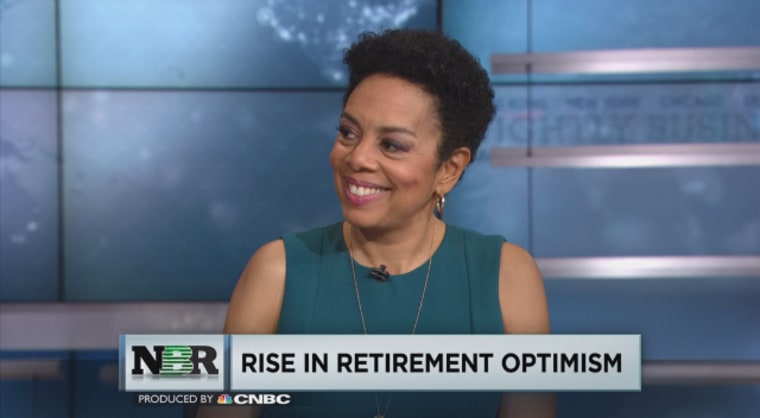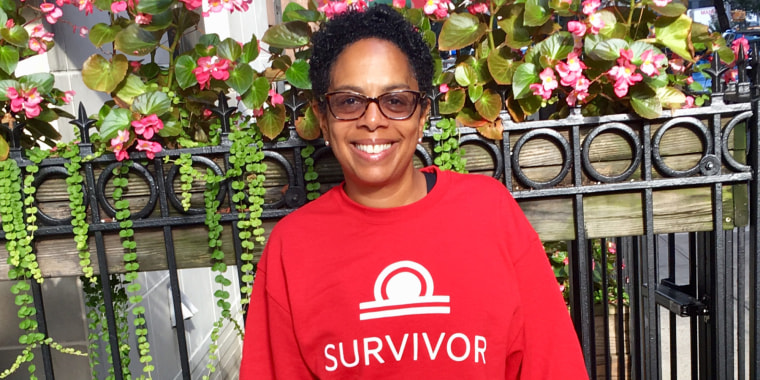Sept. 21, 2016 started like any other day for Sharon Epperson, CNBC’s senior personal finance correspondent. She ate breakfast with her family, got her kids off to school and headed to the gym before work.
During her exercise class, she felt a relentless, migraine-like pain in the back of her head and neck. Something was very, very wrong. “Rather than power through, I got out of there and had my husband pick me up,” Epperson, 51, recounted to Know Your Value. “The pain was so intense, I didn’t think I should drive.”
Her husband took her to a doctor who, fortunately, had an extensive emergency room background. He realized the severity of her condition and immediately sent her to the local hospital. A CT scan revealed Epperson had a ruptured brain aneurysm, which can often be fatal. And of those who survive the condition, about 66 percent suffer some type of permanent neurological deficit.
A survivor’s tale
Epperson’s surgery was successful, but she faced a long road to recovery. “Without warning, I was suddenly disabled, uncertain of whether or when I could ever be able to return to my career,” she said.
At CNBC, Epperson covers how people manage, grow and protect their money. And fortunately, she practiced what she preached: She had a plan in place to help her family make decisions on her behalf and insurance to help pay for her medical bills and recovery time.

Epperson endured over a year of rehabilitation, re-learning how to maintain her balance, walk and perform day-to-day activities. She resumed her position at CNBC in 2017 and has since become dedicated to weaving her new perspective into her personal finance coverage for the network.
“Now I know first-hand that advice can be life-saving, especially when an unexpected disaster changes your life,” said Epperson, who lives in New York's Westchester County. “I returned to work more determined than ever to make sure that my reporting helps people become financially empowered.”
Plan for rainy days
Almost 30 percent of households in the U.S. have less than $1,000 saved. A traumatic event – whether it is a disability, divorce, accident or loss of life – can quickly wipe out that savings.
“You’ll often hear financial advisors say to save for a ‘rainy day.’ Well in my case that rainy day became a hurricane,” Epperson said.
She recommended taking steps now, at any income level, to put a financial plan in place that designates your health and finance decision makers and allows you to start to build an emergency savings. Because you will need to cover many expenses and insurance checks aren’t like paychecks that show up on a set schedule. “Even though we had a great health insurance plan and disability insurance, there was a shortfall. That’s why it’s so important to prepare and have the money you’ll need,” Epperson said.
She also recommended calendaring regular appointments to think about your money.
“The most important thing is to get started,” said Epperson.
A little bit goes a long way
Financial advisors suggested having six months to a year’s worth of living expenses, which can sound intimidating. Epperson recommended starting slowly with the goal of saving enough money to cover what you spend for one month. To build up that first month’s savings, you can have a portion of your paycheck, say 5 to 10 percent, automatically deposited into a money market or savings account.
Next, Epperson suggests having the “money talk” with your loved ones to discuss your wishes about your health care and financial goals. It’s advisable to have an estate plan with prepared legal documents that identify who will do what in terms of medical decisions, caring for your children and taking over tasks like bill paying.
Finally, review your health insurance to make sure you have adequate coverage. Also, you should have disability insurance, which Epperson said is “essential” to getting through a major medical crisis. If you don’t have employer-provided insurance, an independent insurance agent can help you explore options and make recommendations that will be affordable and provide you with financial protection.
Appreciate life
One final lesson: take care of yourself.
Epperson schedules a 15-minute break into each day to meditate. “We need to give ourselves this gift. It helps us know, protect and increase our value. You need to protect yourself mentally, physically and financially. “Connecting those parts is so important, so you’ll still here for your loved ones,” she said.
And listen to your body. “If I had tried to power through my aneurysm — if I just went home and took an Advil — I could be dead.”
